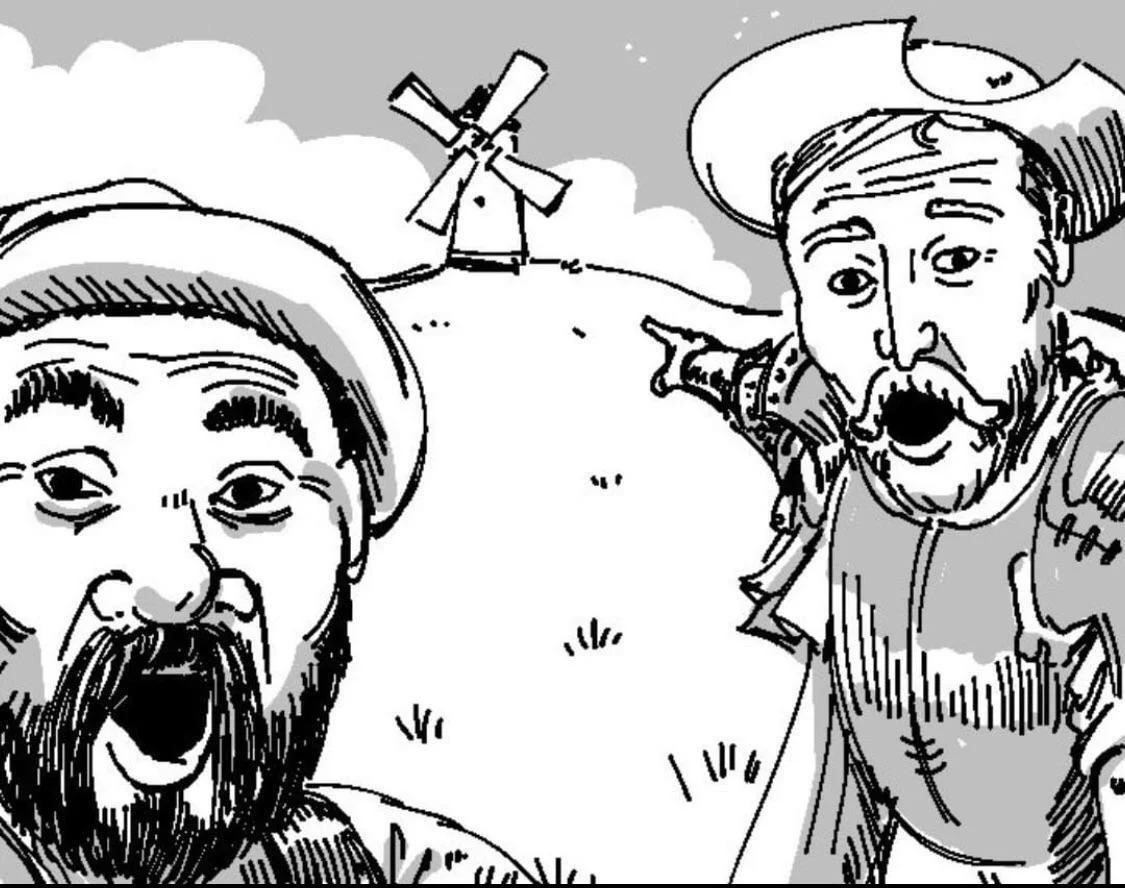Cervantes was truly the ahead of his time. If Don Quixote was made today it would be about a delusional capeshit fanboy, who one day decided to dress up like Captain Amerika with the help of some hobo. He would go on “quests” fighting “nazis” who are actually just regular people, all while simping for some broad he never talked to.










Jump in the discussion.
No email address required.
I want to read Don Quixote (such a dumb way to spell it btw) sometime
Jump in the discussion.
No email address required.
It's really fun. The John Ormsby translation seems pretty good, and it's free on project gutenberg.
https://www.gutenberg.org/ebooks/996
jewish lives matter as much as imaginary knights and dragons.
Jump in the discussion.
No email address required.
More options
Context
Don Quijote is great. Is very long, but more than worth it. I can’t attest the quality of English translations though. I read it in spanish, and the first part before the novel is filled with sonnets, translating those would be like translating Shakespeare one’s, they would lose all of their rimes. But a good translator can probably do the main story justice.
Is written that way because in the 17th century, the letter “x” in spanish was used as a “j”. There was some consonant shift in pronunciation in the late 17th century, and j which is like an “h” in english, replaced the “x”. Hence “Mexico” or “Texas”
Jump in the discussion.
No email address required.
Oh that's interesting. In russian we have this letter х (not to be confused with english x) which also is responsible for the 'h' sound. Similarly I know that in hellenic alphabet they have the letter chi which also looks like x and is read as 'h'.
I always wondered why in spanish j is read as h and I guess I have finally got my answer
Jump in the discussion.
No email address required.
This was probably the worst translated book I ever read, it sucked all the flavor of everything Russian out of it and translated into straight up bongspeak right down to fricking up the Russian manner of employing gender specific surnames. No samovars here, only tea pots.
Jump in the discussion.
No email address required.
In Argentina I saw a spanish translation of Anna Karenina where they translated the names. Stepan Oblonsky became “Estaban Oblonsky”, so cringy. At least the brazilian editions don’t do that.
Jump in the discussion.
No email address required.
More options
Context
Here's translation sneed
This is a known issue and the biggest translators for Ivan nonsense, P&V have an r-slured manner of translation where one directly translates and the other rewrites into literary English. The consequences of not liberally using footnotes has been disastrous for the translation community.
https://www.commentary.org/articles/gary-morson/the-pevearsion-of-russian-literature/
https://www.firstthings.com/blogs/firstthoughts/2013/01/the-pevearvolokhonsky-hype-machine-and-how-it-could-have-been-stopped-or-at-least-slowed-down
https://www.theparisreview.org/interviews/6385/the-art-of-translation-no-4-richard-pevear-and-larissa-volokhonsky
Jump in the discussion.
No email address required.
More options
Context
More options
Context
Indeed they are, and that’s sad as i’ll probably never be able to read the Iliad and Tolstoy in the originals
In portuguese the x is pronounced as a “sh”. So brazilians pronounce “Meshico” and Dom “Quishote”.
Jump in the discussion.
No email address required.
More options
Context
More options
Context
More options
Context
Read either the Grossman translation for a more modern render or the Orsmby translation for a more Shakespearean render.
Here's a comparison of the same passage
Orsmby translation: In a village of La Mancha, the name of which I have no desire to call to mind, there lived not long since one of those gentlemen that keep a lance in the lance-rack, an old buckler, a lean hack, and a greyhound for coursing. An olla of rather more beef than mutton, a salad on most nights, scraps on Saturdays, lentils on Fridays, and a pigeon or so extra on Sundays, made away with three-quarters of his income. The rest of it went in a doublet of fine cloth and velvet breeches and shoes to match for holidays, while on weekdays he made a brave figure in his best homespun.
Grossman translation: Somewhere in La Mancha, in a place whose name I do not care to remember, a gentleman lived not long ago, one of those who has a lance and ancient shield on a shelf and keeps a skinny nag and a greyhound for racing. An occasional stew, beef more often than lamb, hash most nights, eggs and abstinence on Saturdays, lentils on Fridays, sometimes squab as a treat on Sundays—these consumed three-fourths of his income. The rest went for a light woolen tunic and velvet breeches and hose of the same material for feast days, while weekdays were honored with dun-colored coarse cloth.
Jump in the discussion.
No email address required.
The Grossman is more accurate.
While “no quiero acordarme” literally means “i don’t want to recall” in the context it meant l I don’t care”. Darn the final part is quite hard to translate, but he did a good job overall. And “Hidalgos” were men of the small nobility, not sure if gentlemen is the right word, but i think is ok. Duelos y quebrantos is a traditional castillan dish.
Jump in the discussion.
No email address required.
That makes sense, Orsmby was the first good translation while Grossman came out recently.
Jump in the discussion.
No email address required.
The Orsmby seems to be more literal, or “word by word”, if it includes footnotes it could be great. Tbh, there is some stuff in Don Quixote that make even spanish speakers search on a dictionary, as 17th century colloquialisms are no longer used. Is kind of similar to modern english speakers reading Shakespeare plays.
Jump in the discussion.
No email address required.
It does, it has 1001 footnotes while the other has comparatively few
Here's the footnotes for the sentence scraps on Saturday
Orsmby: The national dish, the olla, of which the puchero of Central and Northern Spain is a poor relation, is a stew with beef, bacon, sausage, chickpeas, and cabbage for its prime constituents, and for ingredients any other meat or vegetable that may be available. There is nothing exceptional in Don Quixote’s olla being more a beef than a mutton one, for mutton is scarce in Spain except in the mountain districts. Salpicon (salad) is meat minced with red peppers, onions, oil, and vinegar, and is in fact a sort of meat salad. Duelos y quebrantos, the title of the Don’s Saturday dish, would be a puzzle even to the majority of Spanish readers were it not for Pellicer’s explanation. In the cattle-feeding districts of Spain, the carcasses of animals that came to an untimely end were converted into salt meat, and the parts unfit for that purpose were sold cheap under the name of duelos y quebrantos—“sorrows and losses” (literally “breakings”) and were held to be sufficiently unlike meat to be eaten on days when flesh was forbidden, among which in Castile Saturday was included in commemoration of the battle of Navas de Tolosa. Any rendering of such a phrase must necessarily be unsatisfactory, and in adopting “scraps” I have, as in the other cases, merely gone on the principle of choosing the least of evils
Vs
Grossman: Cervantes describes typical aspects of the ordinary life of the rural gentry. The indications of reduced circumstances include the foods eaten by Don Quixote: beef, for example, was less expensive than lamb.
Jump in the discussion.
No email address required.
That’s great
So true, duelos y quebrantos literally means “mournings and breakings”. I had to check out on the internet the first time I read that because I couldn’t make sense of it. Strange name for a dish.
Jump in the discussion.
No email address required.
More options
Context
This is a really long way of saying you don't frick.
Jump in the discussion.
No email address required.
More options
Context
More options
Context
More options
Context
More options
Context
More options
Context
Thanks friend
Jump in the discussion.
No email address required.
More options
Context
All those words won't bring daddy back.
Jump in the discussion.
No email address required.
More options
Context
More options
Context
More options
Context